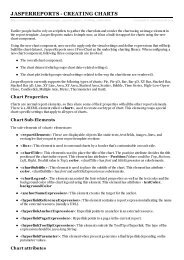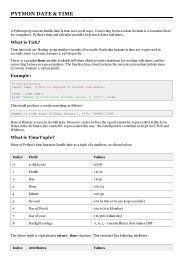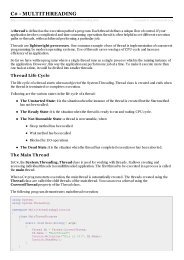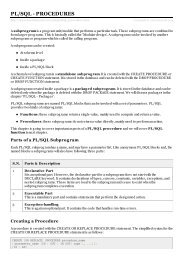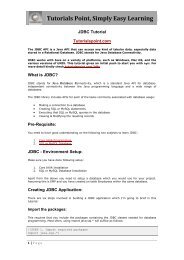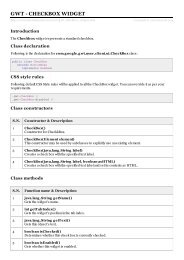Download Scala Tutorial (PDF Version) - Tutorials Point
Download Scala Tutorial (PDF Version) - Tutorials Point
Download Scala Tutorial (PDF Version) - Tutorials Point
Create successful ePaper yourself
Turn your PDF publications into a flip-book with our unique Google optimized e-Paper software.
val t = new Tuple3(1, "hello", Console)<br />
The actual type of a tuple depends upon the number and of elements it contains and the types of those elements.<br />
Thus, the type of (99, "Luftballons") is Tuple2[Int, String]. The type of ('u', 'r', "the", 1, 4, "me") is Tuple6[Char, Char,<br />
String, Int, Int, String]<br />
Tuples are of type Tuple1, Tuple2, Tuple3 and so on. There currently is an upper limit of 22 in the <strong>Scala</strong> if you need<br />
more, then you can use a collection, not a tuple. For each TupleN type, where 1 scala Test<br />
Sum of elements: 10<br />
C:/><br />
Iterate over the Tuple:<br />
You can use Tuple.productIterator() method to iterate over all the elements of a Tuple. Following is the example to<br />
concatenate two Maps:<br />
object Test {<br />
def main(args: Array[String]) {<br />
val t = (4,3,2,1)<br />
}<br />
}<br />
t.productIterator.foreach{ i =>println("Value = " + i )}<br />
When the above code is compiled and executed, it produces the following result:<br />
C:/>scalac Test.scala<br />
C:/>scala Test<br />
Value = 4<br />
Value = 3<br />
Value = 2<br />
TUTORIALS POINT<br />
Simply Easy Learning



